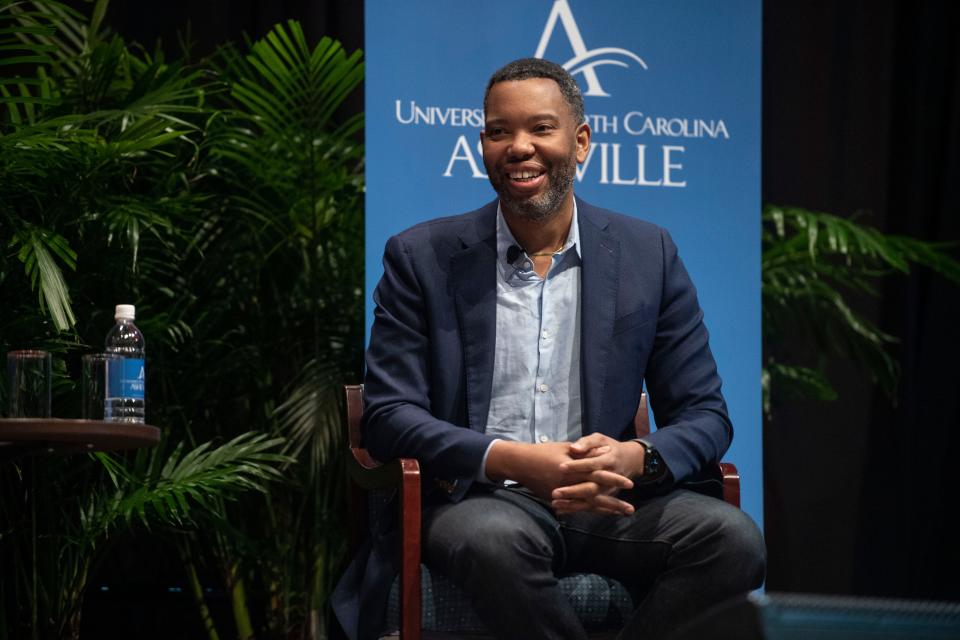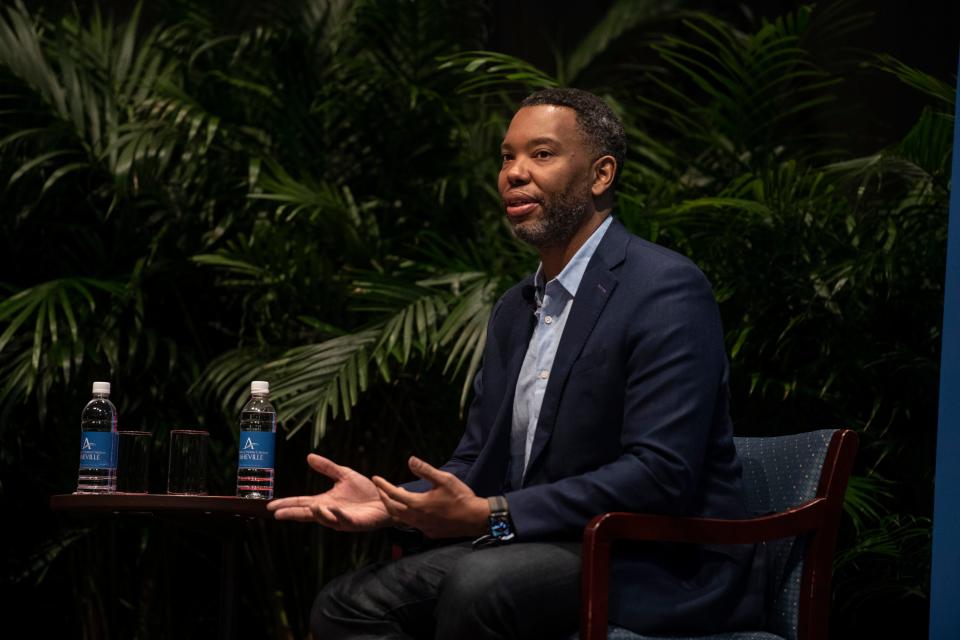Author Ta-Nehisi Coates found his way through F. Scott Fitzgerald's words
- Oops!Something went wrong.Please try again later.
- Oops!Something went wrong.Please try again later.
When author Ta-Nehisi Coates visits Montgomery to accept the 2023 Fitzgerald Prize for Literary Excellence, it's not about personal glory. It's about honoring a source of inspiration.
"I'm not the most public of people," said Coates, a Baltimore, Md., native who has a love for author F. Scott Fitzgerald's writing style. "I guess the best way to put this is that I would not do this unless there was something that's a really deep emotional connection. In this case, there really is."
Alaina Doten, the Fitzgerald Museum's executive director, said the award will be presented Sept. 22 in the auditorium at Alabama State University's Ralph David Abernathy Hall, College of Education, 1625 Harris Way in Montgomery. The ceremony is 6:30-8 p.m., and includes a discussion between Coates and Dr. Derryn Moten, professor of history at ASU. General admission tickets can be purchased for $28 through an Eventbrite link at thefitzgeraldmuseum.org.
Guests should note that the location has been changed from the originally scheduled Davis Theatre. As of Tuesday, promotional and ticket sales links still listed the Davis.

Coates is an award-winning author and journalist, with bestsellers like "The Beautiful Struggle," "We Were Eight Years in Power," "The Water Dancer" and "Between The Word And Me." His books promote social and racial understanding, and foster American storytelling.
Comic book fans know his work as well. He's written for Marvel's "Black Panther" and "Captain America."
Looking back on his own origin story, Coates was once a 20-year-old student at historically Black Howard University in D.C. He recalls picking up Fitzgerald's 1925 novel "The Great Gatsby" for the first time there and reading it one day. No, it wasn't for an assignment.
"Much of what I learned, I didn't learn in class," he said. "I learned in the library. I learned with communication with other people. I learned in workshops."

He said "Gatsby" is one of the most efficient works he's ever read.
"It taught me how to write, man," Coates said. "There's a scene in 'Between The World And Me' where I try to describe what it was like to walk up on the yard at Howard University. When I was writing that, I would go back and read Fitzgerald's description early in the book of a party at Gatsby's house. I can remember how transfixed I was. Him talking about the discarding of the half oranges, and how much detail. That was about 70 years from its publication when I read it, and yet I felt like I was right there."
He re-read "Gatsby" a couple of years ago and said it still holds up today.
"I always considered myself quite fortunate because I was never taught 'Gatsby.' I had to discover it on my own, and discover it outside of much of the dialogue around it," said Coates, who these days is also a writing instructor.
Coates talked more about his life and writing style with the Advertiser:
When was it that you first felt the urge to write?
"My mother was a teacher, and she taught me how to read when I was very, very young. I was always fascinated by words. I came up in the era of hip hop. I was very fascinated by rap as an artform. I've always loved writing. I came up in a household with a lot of books. All my family are big readers."
Do you have brothers and sisters?
"I do. I have six of them."
Did growing up in a big family influence your creativity?
"I don't know that it did. Growing up, my primary influences were my mother and father, from that perspective. I had an older brother who had really, really varying music tastes and would bring a lot of music home. That probably influenced me quite a bit."
Any interests outside of writing?
"I have a very, very simple life. I have a family and my career, and that's pretty much it."
Is your son into literature?
"He's 23... He reads a lot. He's a big reader."
What do you hope people take away from reading your works?
"I don't think about it like that. What I think about is being as clear as I possibly can. For myself, I usually have some sort of question that I'm trying to answer."
Do you write for long periods, or space it out?
"I probably space it over a period of time. I try to get a certain amount done per day. These things, you need time. You need to let it cook. You need to be able to revise it. My worst work usually comes when I don't have time. I need the time."
As someone who writes different things — novels, essays, comic books — how does your writing style differ between them?
"Obviously, you try to do different things in each one. But the thing that I focus on, there are certain core values that are always true. Efficiency is one of them. Intentionality. Knowing why you're there, why you're writing, why you're doing the thing. You have an absolute priority about that. It's really, really important... A lot of times, I boil it down to using as few words as possible. Make sure every word counts."
Is it much different for comics?
"Honestly, comic books and screenplays are different. As a writer, you're trying to get out of the way. You're not carrying everything. There's a partnership that happens there."
How did the association with Marvel Comics come about?
"One of the editors there Tom Brevoort reached out to me and asked if I would be interested in writing comic books, and they brought me in for 'Black Panther.'"
You also wrote for Captain America. What's your take on Sam Williams (formerly Falcon) stepping into the role?
"The film got the idea from the comics to do that. It's interesting. It's really, really interesting. That was not the Captain America that I wrote. I wrote Steve Rogers. I'm looking forward to seeing what comes out of the films."
Montgomery held its first Urban Nerd Con a year ago, a convention dedicated to Black characters and creators. It's founder Roy Eavins described himself and many of the convention attendees as "Blerds" — Black nerds. Is that a term you'd use for yourself?
"That's probably not a name I would use, but if somebody called me that, it's not upsetting to me."
Montgomery Advertiser reporter Shannon Heupel covers things to do in the River Region. Contact him at sheupel@gannett.com.
This article originally appeared on Montgomery Advertiser: Author Ta-Nehisi Coates found his way through Fitzgerald's words

